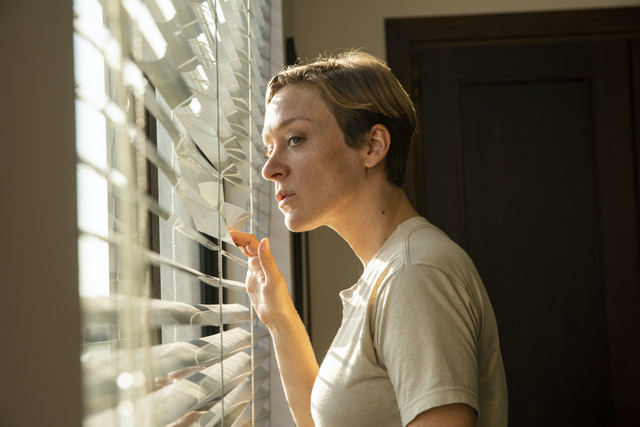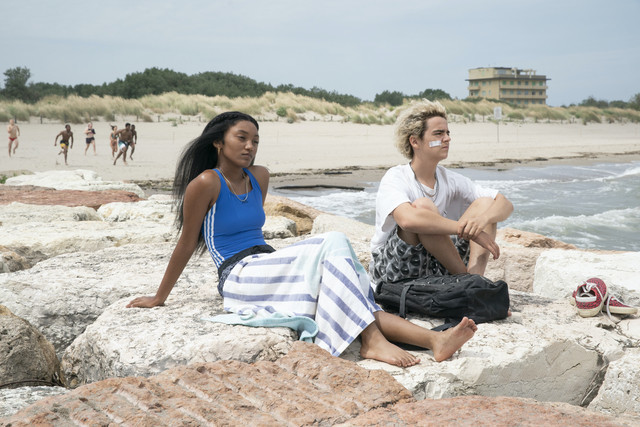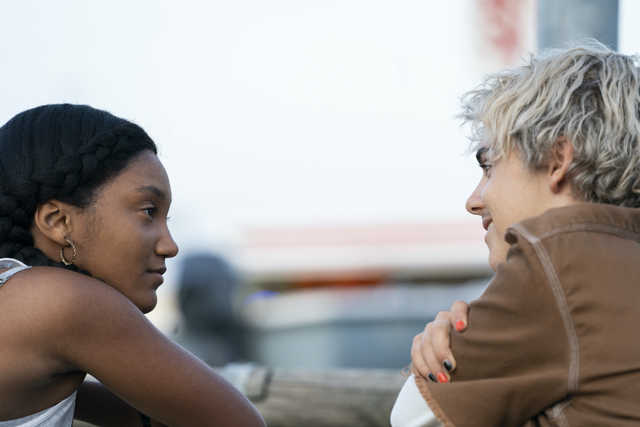“It was during this sorrow that love came to me. Live still, I am life. […] I am the god that comes down from the heavens, and makes of the Earth a heaven. I am love!”
These lyrics from Umberto Giordano’s classic aria, “La mamma morta,” as translated by an AIDS-stricken lawyer (Tom Hanks) in Jonathan Demme’s “Philadelphia,” make only a fleeting cameo in Luca Guadagnino’s “I Am Love,” though the song is referenced in its very title. This scene from the 1993 drama, which deservedly earned Hanks his first Oscar, is glimpsed on the bedroom television of Emma (Tilda Swinton), the Russian wife of a wealthy Milanese businessman.
Just as Hanks’ character was shunned by former colleagues because of his homosexuality, Emma’s daughter is certain that the rest of her patriarchal family won’t be accepting of her burgeoning identity as a lesbian. She does, however, confide in her mother, and this revelation sparks a newfound awareness in Emma of how her assigned role as a dutiful Italian wife runs in direct conflict with her primal passion. The exhilaration that registers on Emma’s face as she finds herself falling head over heels for a young chef reverberates through every frame of Guadagnino’s new HBO series, “We Are Who We Are,” an eight-part opus that is guaranteed to stand as an essential work in the director’s oeuvre.
Premiering a full decade after the U.S. release of “I Am Love,” “We Are Who We Are” not only channels the style and tone of that cinematic masterwork, it also shares the filmmaker’s signature theme of outsiders cast adrift in an rigid environment who must come to terms with their real selves. Though only the first four episodes were made available to press for review purposes, it appears that each hour is treated as a standalone movement in a larger symphony, with at least the initial half of them bestowed with the subtitle, “Right Here Right Now.”
It’s no mystery why HBO would find Guadagnino to be an ideal candidate to helm a taboo-busting epic revolving around adolescents, considering his success with 2017’s equally rapturous “Call Me By Your Name.” Viewers who flocked to the network’s recent boundary-pushing hit, “Euphoria,” which featured gender-balanced nudity and a young ensemble that defied stereotypes, won’t hesitate in embracing this show as well, even though its pacing is much less frenetic. It’s a joy to watch Guadagnino and editor Mario Costa (“Suspiria”) take time, particularly in the first two episodes, to luxuriate in the small, often unarticulated details that would normally be truncated had the sprawling narrative been squeezed into a feature.

The first face we see is that of high school freshman Fraser (Jack Dylan Grazer, the motormouthed scene-stealer from “Shazam!”), as he demonstrates his penchant for blotting out the murky voices of adults with his earbuds. In broad strokes, he resembles Timothée Chalamet’s protagonist from “Call Me By Your Name” in his wiry physique and verbal eloquence punctuated by words like “copacetic.” His preoccupation with “Threshold,” the opening poem in Ocean Vuong’s acclaimed compilation, Night Sky With Exit Wounds, is striking, since it seems to replicate the experience he had of stumbling into a shower room.
Newly arrived on an American army base in Italy, where his mother Sarah (Chloë Sevigny) has been tasked with replacing its commander, Fraser wastes no time in exploring the grounds until he comes upon a group of men showering together. He locks eyes with Jonathan (Tom Mercier, the delightfully uninhibited star of Nadav Lapid’s galvanizing “Synonyms”), a soldier and fellow Vuong enthusiast, who is amused by the boy’s lingering gaze and makes no attempt at covering the object of interest. None of the other kids Fraser’s age on the base trigger his curiosity with the same level of intensity—with the one major exception of Caitlin (wonderful newcomer Jordan Kristine Seamón), a student who he finds reading aloud a love poem in class.
If this were an ordinary coming of age series, the meticulous build-up to Fraser and Caitlin’s first substantial conversation would lead to romance, which is precisely how their peers misinterpret the bond that is forged between them. Once the story flips back in time to view the events in episode one from Caitlin’s perspective, we realize there are far more layers to her than may have met the eye. Her tendency to dress in boyish attire causes onlookers to mistake her for male (in those cases, she goes by the name Harper), and though even the press notes refer to her with female pronouns, her true identity has yet to be fully determined. Whereas Fraser’s contempt for his mother and bitterness at having been uprooted from his home in the states erupts in frightening violence, Caitlin proves to have an equally bruising dynamic with her father, Richard (Kid Cudi), and not just in a physical sense (though her playful attempt to spar with him results in her getting slugged).
With the 2020 presidential election on the imminent horizon, the choice to set “We Are Who We Are” on the precipice of Trump’s 2016 victory is especially charged. An outdoor screening of a baseball game is disrupted by a blaring Trump ad in which the presidential candidate calls for a Muslim travel ban. It’s not long after that when Richard excitedly invites Caitlin to try on his newly purchased MAGA hat, which his daughter’s hair makes difficult to secure on her head, as if out of protest. Richard is a loving father in many ways, though it remains to be seen whether the president’s transgender military ban will factor into future episodes.
It is in the third and best episode screened for critics that Guadagnino’s show truly emerges as a sublime ensemble piece, and casting director Carmen Cuba (“Stranger Things,” “Mrs. America”) must be credited for the remarkable array of talent that holds our fascination, even as the focus shifts from our central duo. Among the standouts is Francesca Scorsese, daughter of Martin, who continuously threatens to steal each of her scenes as Britney, an exuberantly flirtatious girl who asks guys to “walk” for her, so she can determine whether or not they are well-hung. Spence Moore II also makes an indelible impression as Caitlin’s god-fearing brother, Danny, who may or may not have repressed feelings for his close friend, Craig (Corey Knight), which is suggested as they stare at one another in a prolonged, extreme close-up.

While Richard bristles at having his military unit be commanded by Sarah simply because she’s a lesbian, his wife, Jenny (Faith Alabi), makes fast friends with Sarah’s partner, Maggie (a luminous Alice Braga). As they stroll together on a detour from the night’s crowded annual festivities, Jenny reveals that she used to identify as Islamic. After marrying Richard, she explains, “I stopped being a lot of things,” a piercing observation that affirms how her soul is aligned with that of Emma’s in “I Am Love.”
Another staple of Guadagnino’s best work is music brimming with anticipation that mirrors a character’s journey of self-discovery, and the original score by Devonté Hynes—coupled with an impeccably curated soundtrack—does not disappoint. Master cinematographer Fredrik Wenzel (“The Square”) may be the real star of episode four, as his immersive imagery is taken to another level once the anarchic teens descend upon a vacant villa to celebrate the impromptu marriage of Craig to his girlfriend Valentina (Beatrice Barichella), before he must report for duty the next morning. A tracking shot following a bag of Ruffles as it is passed along between the peers exemplifies how Fraser has been accepted as a member of the group, while another finds the kids’ inebriated hysteria reaching a fever pitch, until the scene abruptly cuts to later in the night.
Caitlin and Fraser become a bit lost in the shuffle here, in part because they are more sexually inexperienced than their pals (Seamón’s bemused reaction to her character’s first tampon is priceless). Fraser eventually admits that a mirror is the only thing he’s kissed in his life, but when an infatuated girl Sole (Vittoria Bottin) plants one on the boy, prompting him to return the favor, Caitlin pointedly tells him never to do that again. When he argues that just because his parents happen to be gay doesn’t mean he is, she thoughtfully counters, “You don’t have to not be gay either.”
What I am looking forward to, above all, in the second half of this series are scenes that deliver further on the promise of a pivotal moment in episode three, where Fraser and Caitlin search for information about transgender identity on their smartphones, as their fingers scroll across the lens (“It’s like a fucking revolution going on inside of you!” he exclaims). No matter what your age, these characters effortlessly serve as avatars for any audience member awakening to the notion that sexuality exists on a spectrum and cannot be confined in patriarchal gender roles, the very kind that the current administration hatefully prioritizes. “We Are Who We Are” is a glorious feast for the senses and a tonic for the soul that aims to keep viewers warm as we plunge into an uncertain fall.
First four episodes screened for review. The series premieres tonight, September 14th, at 9pm CT on HBO.












